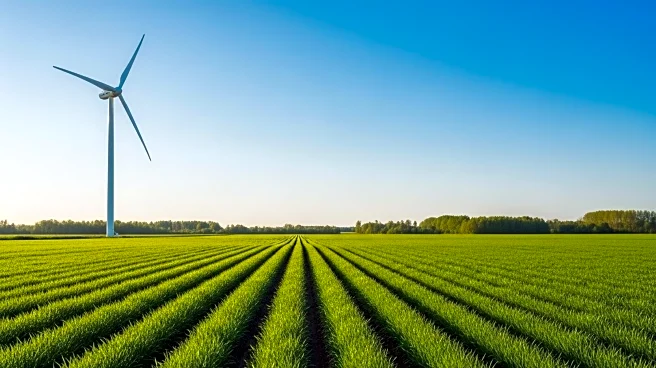What's Happening?
The global sustainable agriculture market is anticipated to grow significantly, reaching a valuation of $33.88 billion by 2032, according to DataM Intelligence. This growth is driven by technological advancements, supportive government policies, and increasing consumer demand for eco-friendly and organic products. Asia-Pacific currently leads the market, benefiting from large agricultural economies like India and China, supported by government initiatives such as India's National Mission for Sustainable Agriculture. The biopesticides segment is experiencing notable growth, driven by eco-friendly pest management practices. Precision farming, AI, and digital agriculture platforms are transforming crop management and market access, contributing to the market's expansion.
Why It's Important?
The expansion of the sustainable agriculture market is crucial for addressing global food security and environmental challenges. As consumer demand for organic and eco-friendly products rises, the market provides opportunities for farmers and companies to adopt sustainable practices. The growth in biopesticides and precision farming technologies supports environmental stewardship by reducing chemical usage and optimizing resource management. This shift towards sustainable agriculture is essential for mitigating climate change impacts and promoting biodiversity, making it a cornerstone of future agricultural policies and practices.
What's Next?
The sustainable agriculture market is expected to continue its growth trajectory, with North America emerging as the fastest-growing region due to investments in farm digitalization and regenerative practices. Government incentives and technological collaborations will further drive the adoption of sustainable practices. The market's expansion presents opportunities for biopesticides, biofertilizers, and regenerative solutions, enhancing the export potential of organic produce. As the market evolves, stakeholders will focus on overcoming infrastructure and market access limitations to scale sustainable practices globally.
Beyond the Headlines
The shift towards sustainable agriculture has deeper implications for global food systems and environmental policies. It encourages the adoption of climate-resilient farming methods, which are vital for adapting to changing weather patterns and ensuring long-term soil fertility. The integration of AI and digital platforms in agriculture not only enhances productivity but also supports data-driven decision-making, fostering innovation in crop management. These developments highlight the importance of sustainable agriculture in achieving global environmental goals and promoting socio-economic stability.









